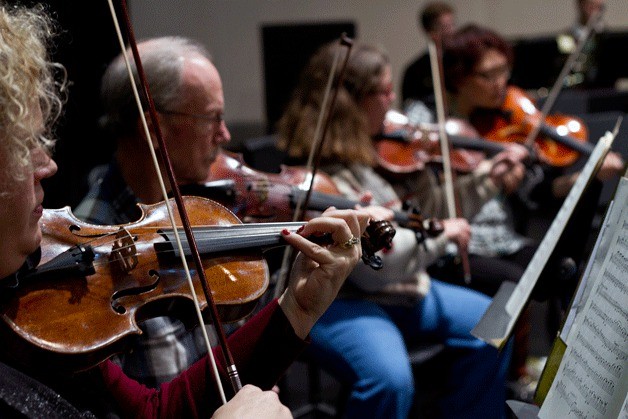Any notions of somber, intense, moody tunes borne out of preconceived notions of the music’s homeland are quickly dispelled in the Bainbridge Symphony Orchestra’s 2014-15 season opener, which features a triple play offering of masterwork pieces from three Russian composers.
The music can be downright playful at times.
As part of BSO’s “Tchaikovsky’s Piano Concerto No. 1,” listeners are treated to three different works by three of Russia’s most talented composers — Pyotr Ilyich Tchaikovsky, Dmitri Shostakovich and Vassili Sergeiovich Kalinnikov — in a special two-time only production featuring special guest pianist Angelo Rondello.
The show opens at 7:30 p.m. Saturday, Nov. 9 and returns the very next day for a 3 p.m. matinée.
Tickets are one sale now, and have pre-sold far more speedily than expected. As of Wednesday, less than a dozen tickets remained available for each show.
Wesley Schulz, the program’s music director and conductor, returns to helm this, his fourth, season of music at BSO.
The medley’s opening production, he said, promises thrills from the start, beginning with Shostakovich’s “Festive Overture.”
 Dmitri Shostakovich wrote “Festive Overture” at a lightning speed in October and early November 1954, Schulz explained. The occasion for the music was the 37th anniversary of the October Revolution. The music is fleet-footed and punctuated by a robust brass section. From the opening fanfare to the breathless conclusion, the music is joyous and self-assured.
Dmitri Shostakovich wrote “Festive Overture” at a lightning speed in October and early November 1954, Schulz explained. The occasion for the music was the 37th anniversary of the October Revolution. The music is fleet-footed and punctuated by a robust brass section. From the opening fanfare to the breathless conclusion, the music is joyous and self-assured.
Following the first piece of the night, Rondello will join the orchestra for the main attraction, a pivotal piece of music from the man who is arguably Russia’s greatest composer: “Tchaikovsky’s Piano Concerto No. 1.”
Many first concertos by composers have had difficult births, and such was the case with the “First Piano Concerto.”
According to Schulz, when Tchaikovsky played it for Nicolai Rubinstein (no relation to Arthur Rubinstein) the latter deemed it vulgar and unplayable. Tchaikovsky was infuriated, and refused to change a note. Later, he did revise some passages but did not overhaul the work. As these stories tend to go, Nicolai Rubinstein eventually had a change of heart and championed the work later in his life.
Rondello is playing with the island orchestra for the first time, but his name may be familiar to Bainbridge music lovers never-the-less.
Rondello, a native of Bellingham, gave his New York debut in the Trinity/St. Paul Concert Series and has performed throughout the U.S. and in Southeast Asia as both a pianist and teacher. He was featured as a “Rising Artist of Asia” at the 2011 Federation of Asian Cultural Promoters Conference and performed at Philamlife Auditorium in Manila with conductor Aries Caces in Beethoven’s “Emperor” Concerto.
He recently gave his Chicago recital debut, at the Chicago Cultural Center, as a part of the Dame Myra Hess Memorial Series, which was broadcast live on WFMT Chicago and across the globe online.
The international pianist said that he was thrilled to be working with BSO and especially Schulz, with whom he had long hoped to collaborate.
“Wes is such an excellent musician,” he said. “He’s one of those rare musicians who have that deep intellect, and walk on the other side too and speak in the vernacular.”
Though the music he plays in this BSO production is from Russia, and he has played and taught extensively on many international stages, Rondello said he does not believe music is quite the “universal language” it is often billed as.
“I think it’s an interesting statement and it’s often repeated,” Rondello explained. “But, we can’t take for granted how much we’ve been culturally conditioned to hear and understand the music that we hear. The things that make sense to us as 21st century Western listeners is completely removed from what sounded consonant to the listener several hundred years ago, for whom our major/minor scale would have been terribly different.”
“It’s universal in that it transcends a language barrier between English and German, and nowadays English and Chinese, for example, because we’re so globalized now,” he added. “But it’s only because we’ve been conditioned.”
The third and final piece of the trilogy, “Symphony No. 1 in G minor,” comes from a composer who Schulz said even many classic music aficionados may not know so well.
The last work in this program is by Vassili Sergeiovich Kalinnikov, he said. Despite the formidable name, Schulz promised the man’s music is filled with melodies that will leave listeners whistling, powerful full-orchestra passages of great strength and fortitude, and in the second movement, tenderness and sensitivity.
This year’s production series marks the orchestra’s 42nd anniversary. For more information and to purchase tickets for this and other upcoming BSO and Bainbridge Performing Arts productions, visit www.bain
bridgeperformingarts.org.


